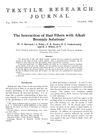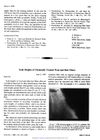 7 citations,
January 2001 in “Annales de zootechnie”
7 citations,
January 2001 in “Annales de zootechnie” Melatonin treatment increases wool production and improves fiber quality in angora rabbits.
 3 citations,
February 2019 in “Animal biotechnology”
3 citations,
February 2019 in “Animal biotechnology” The PLP2 gene affects cashmere fiber quality in goats and is linked to hair growth and loss.
1 citations,
January 2011 in “Journal of Animal Science and Veterinary Medicine” Injecting melatonin improves cashmere yield by enhancing fiber growth in goats.
 44 citations,
December 1991 in “Annals of the New York Academy of Sciences”
44 citations,
December 1991 in “Annals of the New York Academy of Sciences” EGF and FGF help hair growth by affecting cell differentiation and fiber growth.
 3 citations,
August 2018 in “Deleted Journal”
3 citations,
August 2018 in “Deleted Journal” Guasha changed rat skin appearance and blood vessels temporarily without affecting certain nerve proteins or fiber structure.
 December 2022 in “Türk biyokimya dergisi”
December 2022 in “Türk biyokimya dergisi” The conclusions are: fecal short-chain fatty acids may help prevent cancer, fiber intake can reduce obesity, weight loss is hard for obese people, low BMI cancer patients are more prone to chemotherapy side effects, intermittent fasting benefits gut health, cherry laurel has health benefits in rats, certain gene variations can increase stress in hair loss patients, fecal acids can affect blood sugar levels, cold agglutinin can affect blood test results in autoimmune patients, and people with Crohn's disease have higher levels of a certain chemical in their blood.
11 citations,
April 2022 in “Biophysical Journal” Disulfide bonds in keratin fibers break more easily under stress, especially when wet, affecting fiber strength.
 10 citations,
April 1995 in “Animal Science/Animal science”
10 citations,
April 1995 in “Animal Science/Animal science” Melatonin implants can change the seasonal prolactin levels and hair growth in adult cashmere goats but not in juveniles, and don't delay spring moult for better fiber harvesting.
6 citations,
February 2021 in “Proteins” Researchers found that the most reachable bonds in wool fibers are near the ends of certain proteins, which help stabilize the fiber's structure.
1 citations,
June 2022 in “Gene reports” The analysis found genes linked to skin and hair development are more active in Pashmina goats, which may explain their long-fiber production.
 262 citations,
May 2017 in “Nanomedicine”
262 citations,
May 2017 in “Nanomedicine” New nanofiber technology improves wound healing by supporting cell growth and delivering treatments directly to the wound.
 48 citations,
February 2008 in “Nutrition in Clinical Practice”
48 citations,
February 2008 in “Nutrition in Clinical Practice” Dietary changes, including weight loss and a balanced diet, are important for managing PCOS, especially in overweight women.
48 citations,
February 2010 in “Molecular biology reports” KAP7.1 and KAP8.2 genes are crucial for cashmere quality in goats.
28 citations,
July 1993 in “The journal of investigative dermatology/Journal of investigative dermatology” Dermal papilla cells are crucial for hair growth and can induce new hair follicles.
25 citations,
April 2017 in “PloS one” Certain genetic variations in the FST gene are linked to better wool quality in Chinese Merino sheep.
 17 citations,
November 2017 in “Asian-Australasian journal of animal sciences”
17 citations,
November 2017 in “Asian-Australasian journal of animal sciences” Certain gene mutations are linked to wool quality in sheep and could help in breeding for better wool.
13 citations,
March 2010 in “International Journal of Cosmetic Science” Hair coloring increases copper and calcium uptake, damaging hair and reducing shine.
 12 citations,
October 1954 in “Textile Research Journal”
12 citations,
October 1954 in “Textile Research Journal” Hair absorbs alkali bromide salts and water, affecting its structure, with absorption decreasing at higher temperatures.
 11 citations,
August 2018 in “Asian-Australasian journal of animal sciences”
11 citations,
August 2018 in “Asian-Australasian journal of animal sciences” Short daily photoperiods improve cashmere production in Inner Mongolia white cashmere goats.
 11 citations,
September 1992 in “Journal of pineal research”
11 citations,
September 1992 in “Journal of pineal research” Immunizing goats against melatonin can temporarily change their cashmere growth cycles and increase fleece production.
10 citations,
March 2005 in “International Journal of Cosmetic Science” Oxidation changes human hair by breaking down fats and forming new acidic groups, affecting how it interacts with conditioners and cosmetics.
 9 citations,
July 2018 in “Journal of Testing and Evaluation”
9 citations,
July 2018 in “Journal of Testing and Evaluation” Adding human hair to sand improves its strength when dry and maintains strength when wet.
9 citations,
June 2014 in “Molecular biology reports” KAP9.2 and Hoxc13 genes are important for cashmere growth and vary in activity during different stages.
 8 citations,
August 2020 in “Domestic Animal Endocrinology”
8 citations,
August 2020 in “Domestic Animal Endocrinology” Melatonin improved cashmere production in goats during the first cycle but had no lasting effects on the next cycle.
8 citations,
May 2008 in “Applied surface science” Mummy hair from the Taklamakan desert has calcium and phosphorus inside.
8 citations,
July 2004 in “Journal of morphology” Marsupial hair structure and keratin distribution are similar to placental mammals.
 7 citations,
December 2017 in “Open Access Macedonian Journal of Medical Sciences”
7 citations,
December 2017 in “Open Access Macedonian Journal of Medical Sciences” Biofibre® hair implants are safe and effective for alopecia when proper procedures are followed, with high patient satisfaction.
 6 citations,
March 1998 in “Textile Research Journal”
6 citations,
March 1998 in “Textile Research Journal” Chemical treatments can change the scale heights of wool and cashmere fibers, affecting their identification.
6 citations,
June 1976 in “Journal of ultrastructure research” Keratinized wool cells still have some organelles like lysosomes and mitochondria.
 5 citations,
October 2011 in “Small ruminant research”
5 citations,
October 2011 in “Small ruminant research” Goat hair growth and follicle activity change with the seasons and differ between males and females.

















